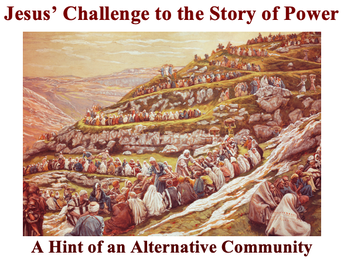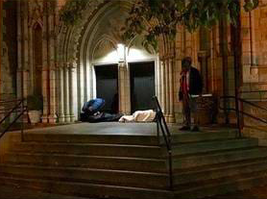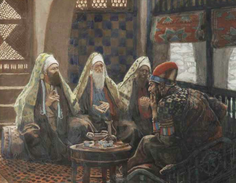 Matthew 14 (Sunday service, 5/12/19) Matthew 14 (Sunday service, 5/12/19) I’m doing some study on Matthew 14 this afternoon and ran across a rather powerful quote from Stanley Hauerwas’s commentary on Matthew. I have been thinking these thoughts for a while now (and I will be sharing some of them this coming (5/12/19) Sunday), namely, that those in power and the powerful must use power to stay in power; sadly, most use of power by the powers and the powerful is threat, violence, or the subtle making of promises to those without power (to grant or take away) something needed. It is this last use of power that is most deceptive and, well, rather powerful. You see, it matters not whether the powers or the powerful actually deliver on said promises, for it is the making of the promises that counts because those with no power have no choice but to acknowledge (bow before, vote for, smile in adoration, applaud or laud, promote, et al.) that it is only in the powers and powerful that they will ever see the good for themselves or their neighborhoods (even though they don’t ever see the promises delivered). In Matthew 14, Jesus (that is, Matthew in the narrative) is hinting at an alternative to power, first in Jesus as that alternative and then at the development (forthcoming, i.e., the forming of the) community that follows Jesus. We, the church (read a local church), are that alternative to the story of power. Here’s the quote:
0 Comments
 Power does not naturally distribute power equitably. This is why, first and foremost, calling upon the powers to distribute power more fairly (whether government, industrial complexes, religious institutions, or business corporations) will not address the problem of power being more equitably distributed. When politicians and civic leaders get elected or into positions because they promise more equitable distribution of power, once in power, they have an idolatrous temptation to remain in power over the very people they claim to advocate for—so, they, too, will not naturally be given to share that power more equitably. As was once said, power corrupts; absolute power corrupts absolutely. The only place power is distributed equitably is at that Table in the (better, yet, a) gathered-church. And, this is exactly what happened in the Book of Acts. This is the background of New Testament Letters like Romans, Galatians, and James; and, for the early church (for the first 150 years or so) . . . and, which, now, should be happening at every gathered-church of strangers and unequals in every locale, on every street, in every neighborhood, and within every community. This is at least one reason why the church, a the local gathered-church, is so, so important. Where this isn’t happening in a local church (i.e., a gathering of strangers and unequals at worship and at Table), there needs to be lament and repentance and correction in righteousness. Our problem is that much of the church (local and institutional) has so aligned with Christendom (that is, a culture that steals from Christianity just enough to control the industrial-church-complex and its own citizenry, but is formed by power-idolatries, such as ours here in the West) that, we, too, have become a power (or powers) that do not naturally distribute power equitably. But this isn’t the gospel, nor is it the body of Christ prescribed in the New Testament. But we didn't learn Christ this way (Ephesians 4:20; cf. 4:17–32). Yet, this is the place (the gathered-church) where power is defeated (Ephesians 6:10-12; Colossians 2:15) and the place where the only power known is the crucified power of the cross of Christ (Gal 2:20). This is the place where “there is neither Jew nor Greek, there is neither slave nor free, there is no male and female” (Gal 3:28); for this is the place all, by one Spirit, have been “baptized into one body—Jews or Greeks, slaves or free—and all were made to drink of one Spirit” (1 Corinthians 12:13); a space “where no Greek and Jew is, that is (kai) [where there is no] circumcised and uncircumcised, barbarian, Scythian, slave, freeman, but all things and in all is Messiah” (Colossians 3:11, my translation). Given that we are subject and, too often, align ourselves to the powers (at least the side of power we like or identify with or the side that seems to give us power, which is an illusion, of course). It is too natural to believe our only recourse for justice is to call upon those in power (i.e., the State or the industrial-complex) to give up power and more equitably redistribute power. But they will not, no matter how much they promise. However, the harder work—which is God’s way in this world now that Christ Jesus has died, been raised, and ascended to the right hand of the Father, and the church, the local gathered-church is His body, His presence in a community—the harder work is ecclesiastical, not simply protest, advocacy, and, certainly not, voting correctly. Our contemporary church-power and the way we tend to advocate in the public square mimics the current systems of power, so it is natural to have “Christian leaders” gain power, who develop followings as a demonstration of their power, to call upon the powers of government and systems of power to do justly. And to punish those who do not. So, what we have—what we end up with--is only “power” vs. “power.” But what God wants is crucified with Christ-power among the church, that is, our local churches (rural, suburban, exurban, and urban), and in church planting (especially in the harder places, the hinterland places, the geographically “unlivable” (and unlikeable) places, the marginal places, the border-places, the places where there is the lack of power).
There is no doubt in my mind. There is no way around it. The issue and problems of justice are a Table issue where the gathered-church exists. We are called to the harder task, church, where justice, that is, the place where the more equitable distribution of power can be experienced, demonstrated, and displayed.
King Herod's role in the Christmas narrative reminds us: Don’t be fooled by power’s kindness. Nor, should we be deceived or taken captive by power’s rhetoric that simulates our faith or about its care for all of humankind. Herod’s words from Matthew's Gospel remind me of how Paul Johnson concluded his book, Intellectuals:
Those with (and/or in) power, whether thrones, government (elected, junta, coup d'état, or inherited), or even the powers that are exercised through business, do not take challengers to their power lightly. They give the allusion of love for humanity and, too often, feign worship to disguise their real intent: control any possible insurrection of their power. Both Christians on the right and the left should be aware of this bent of power's intentions. Power is never, ever a friend to the gospel of Jesus Christ. Never. Ever. Think more deeply about Christmas. Chip M Anderson is the author of Wasted Evangelism: Social Action and the Church's Task of Evangelism. A deep, exegetical read into the Gospel of Mark. All royalities go to support his church planting ministry in the Hill community of New Haven, CT. The book or its e-formats can be found on Amazon, Barns'n Nobel, (and most other online book distributors) or through the publisher, Wipf & Stock directly.
|
AuthorChip M. Anderson, advocate for biblical social action; pastor of an urban church plant in the Hill neighborhood of New Haven, CT; husband, father, author, former Greek & NT professor; and, 19 years involved with social action. Archives
February 2024
Categories
All
|
Pages |
More Pages |
|

 RSS Feed
RSS Feed